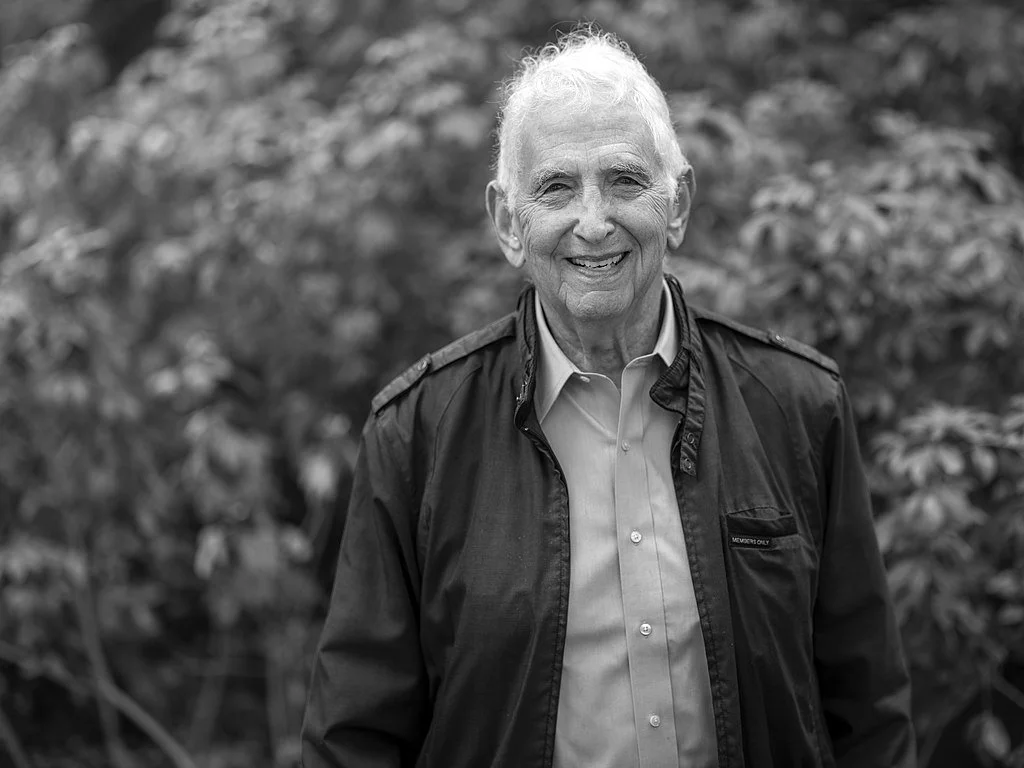Daniel Ellsberg
2021 BLUEPRINT LIFETIME ACHIEVEMENT AWARD
Photo: Image licensed under CC BY-SA 4.0
Updated: June 2023
Daniel Ellsberg is possibly the most famous whistleblower in the world. This year marks the 50th anniversary of the publication of the Pentagon Papers – classified documents about the Vietnam War that he leaked to the press.
The Pentagon Papers were commissioned by the US secretary of defence in 1967. They documented the secret history of US political and military involvement in Vietnam over more than two decades against the backdrop of an escalating conflict.
A military analyst who had served in Vietnam, Ellsberg had worked on drafting that secret history. It showed that the war in Southeast Asia had been a disaster for years, above all for the Vietnamese, but also for the US.
His decision to leak the papers was in part prompted by attending a conference hosted by the War Resisters League. One of the speakers was about to go to prison for resisting the military draft and refusing to be sent to fight in Vietnam.
Ellsberg said, “He put the question in my head, ‘What can I do to help end the war now that I am ready to go to prison for it?”
The documents held no real military value for the enemy because they mostly covered policy issues. Ellsberg considered himself a loyal patriot, but what he discovered about the war the US was waging in Southeast Asia was not what the public was being told.
There were no USB thumb drives then or digital drop boxes. So Ellsberg spent a great deal of time photocopying the 7,000-page collection that comprised the Pentagon’s secret Vietnam report. He leaked tthe documents to The New York Times, and the documents became known as the Pentagon Papers.
President Richard Nixon’s government brought a legal suit to restrain The New York Times from continuing to publish stories based on the papers. This was an unprecedented move, the first time in modern US history when the federal government sought to impose “prior restraint” on a newspaper to halt publication for national security reasons.
The government was awarded a temporary halt to publication via a restraining order, which The Times obeyed.
Ellsberg delivered the Pentagon Papers to 18 other newspapers. The government tried to win a prior restraint ruling against The Washington Post too. The judge refused to grant one, but the US Court of Appeals for the Washington DC circuit overturned that judge’s decision.
Fast-tracked to the US Supreme Court, the court upheld the right of newspapers to publish the story. It was a landmark legal ruling that has provided increased protection to free media in the US ever since. Justice Black wrote: ‘The press [is] to serve the governed, not the governors.”
Meanwhile, the US government launched a direct attack on the whistleblower. Criminal proceedings were instituted against Ellsberg, who faced prosecution on twelve federal felony counts, carrying a possible jail sentence of 115 years.
In an unprecedented move, the Espionage Act was used to go after Ellsberg. It was the first time the government had used the act against a whistleblower.
Of significance, too, was that it marked the beginning of a pattern that would be repeated later. Since President Barack Obama took office, at least eight whistleblowers have been charged with crimes under the Espionage Act for what are clearly acts of whistleblowing, not espionage.
In 2019 US prosecutors took this overreach a step further by charging a journalist, Julian Assange, for the first time under the same statute – simply for publishing information from whistleblowers.
The US government ran a dirty tricks campaign against Ellsberg when his case got underway. Operatives broke into his psychiatrist’s office to steal his medical records. They also set up illegal phone taps and committed other criminal acts. Years later, the government used similar dirty tricks against Assange, including warrantless surveillance, illegal breaches of legally privileged conversations and hatching plans to assault and kidnap him.
The judge in Daniel Ellsberg’s case eventually threw out the criminal charges because the “totality of the circumstances” surrounding the government’s criminal actions against him offended “a sense of justice”.
Since then, Daniel Ellsberg has spent the last 50 years attending protests. He tirelessly defends a citizen’s right to know and to speak truth. His is an extraordinary record of service to the public.
Congratulations Daniel Ellsberg, winner of the 2021 Blueprint for Free Speech Lifetime Achievement Award.
Update: Daniel Ellsberg passed away in June 2023.

